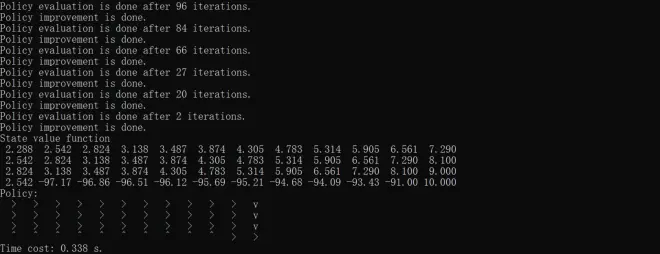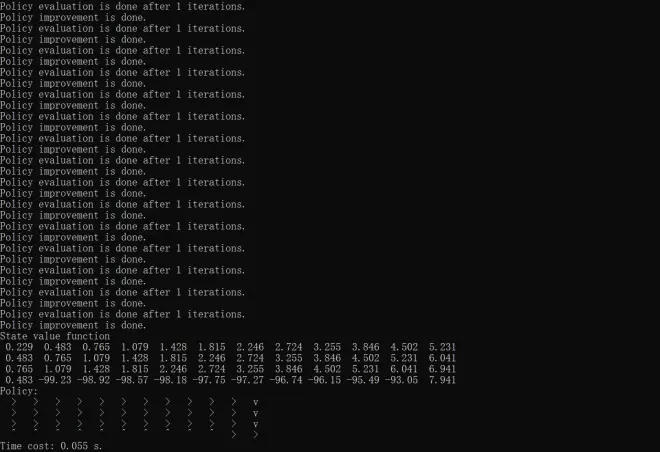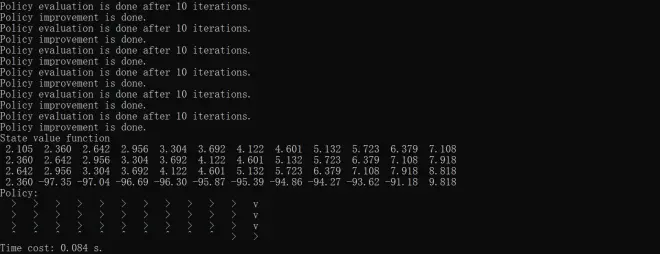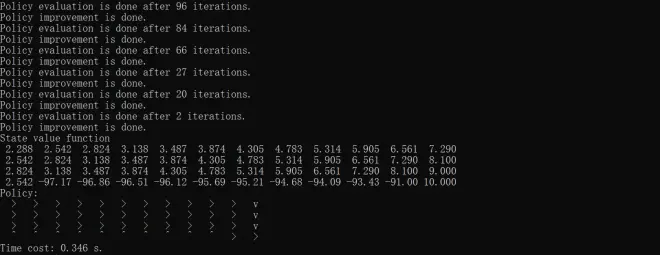Reinforcement Learning_Code_Dynamic Programming
CliffWalkingEnv.py
import numpy as np
class CliffWalkingEnv:
'''
Environment of cliff walking problem.
P[state][action] = [(p_rsa, reward, next_state)]
p_rsa: p(reward|state, action).
'''
def __init__(self, nrow = 4, ncol = 12):
self.nrow = nrow
self.ncol = ncol
self.action_space = [[-1, 0], [0, 1], [1, 0], [0, -1], [0, 0]]
self.P = self.createP()
def createP(self):
P = [[[] for actions_number in np.arange(len(self.action_space))]
for states_number in np.arange(self.nrow * self.ncol)]
for i in np.arange(self.nrow):
for j in np.arange(self.ncol):
now_state = i * self.ncol + j
reward = 0
if i == self.nrow - 1:
if j == self.ncol - 1:
reward = 1
elif j > 0:
reward = -100
for action_index in np.arange(len(self.action_space)):
next_i = max(0, min(self.nrow - 1,
i + self.action_space[action_index][0]))
next_j = max(0, min(self.ncol - 1,
j + self.action_space[action_index][1]))
next_state = next_i * self.ncol + next_j
P[now_state][action_index] = [(1, reward, next_state)]
return PPolicyIteration.py
import numpy as np
import copy
class PolicyIteration:
'''
Policy iteration algorithm.
Input:
env: Environment of the problem.
gamma: Discount.
theta: Convergence threshold.
Member:
self.v[s]: State value function of state s.
An initial guess filled with zero is given.
self.pi[s][a]: Policy of (state s, action a).
'''
def __init__(self, env, gamma = 0.9, theta = 1e-3):
self.env = env
self.v = [0] * self.env.nrow * self.env.ncol
self.pi = [[1.0/len(self.env.action_space)
for action_idx in np.arange(len(self.env.action_space))]
for states_number in np.arange(self.env.nrow * self.env.ncol)]
self.gamma = gamma
self.theta = theta
def policy_evaluation(self):
'''
Calculates state value for all states under current policy and updates
self.v.
Input:
None.
Output:
None.
max_delta: Maximum difference between old state value
and new state value.
new_v[s]: State value of state s under current policy.
old_q[a]: Action value of (fixed state s, action a) under old policy.
'''
iteration = 0
while True:
iteration += 1
max_delta = 0
new_v = [0 for i in np.arange(self.env.nrow * self.env.ncol)]
for state in np.arange(self.env.nrow * self.env.ncol):
old_q = [0 for i in np.arange(len(self.env.action_space))]
for action_index in np.arange(len(self.env.action_space)):
for p_rsa, reward, next_state in \
self.env.P[state][action_index]:
old_q[action_index] += (p_rsa * reward
+ self.gamma * self.v[next_state])
old_q[action_index] *= self.pi[state][action_index]
new_v[state] = sum(old_q)
max_delta = max(max_delta, abs(new_v[state] - self.v[state]))
self.v = new_v
if max_delta < self.theta:
break
print("Policy evaluation is done after %d iterations." % (iteration))
def policy_improvement(self):
'''
Improve the policy at every state s.
Input:
None.
Output:
The updated policy.
new_q[a]: Action value of (fixed state s, action a) under new policy.
optimal_q: Optimal action value.
count_optimality: Number of actions with optimal action value.
'''
for state in np.arange(self.env.nrow * self.env.ncol):
new_q = [0] * len(self.env.action_space)
for action_idx in np.arange(len(self.env.action_space)):
for p_rsa, reward, next_state \
in self.env.P[state][action_idx]:
new_q[action_idx] += (p_rsa * reward
+ self.gamma * self.v[next_state])
optimal_q = max(new_q)
count_optimality = new_q.count(optimal_q)
self.pi[state] = \
([1.0/count_optimality
if (new_q[action_idx] == optimal_q) else 0
for action_idx in np.arange(len(self.env.action_space))])
print("Policy improvement is done.")
return self.pi
def policy_iteration(self):
'''
Iteratively perform policy evaluation and policy improvement until the
policy converges.
old_policy: Policy before improvement.
new_policy: Policy after improvement.
'''
while True:
self.policy_evaluation()
old_policy = copy.deepcopy(self.pi)
new_policy = self.policy_improvement()
if old_policy == new_policy:
breakValueIteration.py
import numpy as np
class ValueIteration:
'''
Value iteration algorithm
Member:
env: The environment of the problem.
gamma: Discount
theta: Convergence threshold.
v[s]: State value of state s. A zero initial guess is given.
pi[s][a]: Action value of (state s, action a).
An average initial guess is given.
'''
def __init__(self, env, gamma = 0.9, theta = 1e-3):
self.env = env
self.gamma = gamma
self.theta = theta
self.v = [0 for state in np.arange(self.env.nrow * self.env.ncol)]
self.pi = [[1.0/len(self.env.action_space)
for action in self.env.action_space]
for state in np.arange(self.env.nrow * self.env.ncol)]
def policy_value_update(self):
'''
Perform policy update and value update.
Input:
None.
Output:
Updated policy.
new_v[s]: Intermediate value of state s.(Not state value.)
q[a]: Intermediate value of (fixed state s, action a).
(Not action value.)
max_delta: maximum difference between old v[s] and new v[s]
'''
iteration = 0
while True:
iteration += 1
max_delta = 0
new_v = [0 for state in np.arange(self.env.nrow * self.env.ncol)]
for state in np.arange(self.env.nrow * self.env.ncol):
q = [0 for action in self.env.action_space]
for action_index in np.arange(len(self.env.action_space)):
for p_rsa, reward, next_state in \
self.env.P[state][action_index]:
q[action_index] = (p_rsa * reward
+ self.gamma * self.v[next_state])
optimal_action_index = q.index(max(q))
self.pi[state] = [1.0 if (action_index
== optimal_action_index) else 0
for action_index in \
np.arange(len(self.env.action_space))]
new_v[state] = q[optimal_action_index]
max_delta = max(max_delta, abs(new_v[state] - self.v[state]))
self.v = new_v
if max_delta < self.theta:
print("Policy update and value update is done", end = '')
print("after %d iterations." % iteration)
break
returnTruncatedPolicyIteration.py
import numpy as np
import copy
class TruncatedPolicyIteration:
'''
Truncated Policy iteration algorithm.
Input:
env: Environment of the problem.
gamma: Discount.
theta: Convergence threshold.
truncate_iteration: maximum iteration in policy evaluation.
Member:
self.v[s]: Intermediate state value of state s. (Not real state value.)
An initial guess filled with zero is given.
self.pi[s][a]: Intermediate policy of (state s, action a).
(Not real policy.)
'''
def __init__(self, env, gamma = 0.9, theta = 1e-3, truncate_iteration = 10):
self.env = env
self.v = [0] * self.env.nrow * self.env.ncol
self.pi = [[1.0/len(self.env.action_space)
for action_idx in np.arange(len(self.env.action_space))]
for states_number in np.arange(self.env.nrow * self.env.ncol)]
self.gamma = gamma
self.theta = theta
self.truncate_iteration = truncate_iteration
def policy_evaluation(self):
'''
Calculates state value for all states under current policy and updates
self.v.
Input:
None.
Output:
None.
max_delta: Maximum difference between old state value
and new state value.
new_v[s]: Intermediate state value of state s under current policy.
(Not real state value.)
old_q[a]: Intermediate action value of (fixed state s, action a) under
old policy. (Not real action value.)
'''
iteration = 0
while iteration < self.truncate_iteration:
iteration += 1
max_delta = 0
new_v = [0 for i in np.arange(self.env.nrow * self.env.ncol)]
for state in np.arange(self.env.nrow * self.env.ncol):
old_q = [0 for i in np.arange(len(self.env.action_space))]
for action_index in np.arange(len(self.env.action_space)):
for p_rsa, reward, next_state in \
self.env.P[state][action_index]:
old_q[action_index] += (p_rsa * reward
+ self.gamma * self.v[next_state])
old_q[action_index] *= self.pi[state][action_index]
new_v[state] = sum(old_q)
max_delta = max(max_delta, abs(new_v[state] - self.v[state]))
self.v = new_v
if max_delta < self.theta:
break
print("Policy evaluation is done after %d iterations." % (iteration))
def policy_improvement(self):
'''
Improve the policy at every state s.
Input:
None.
Output:
The updated policy.
new_q[a]: Action value of (fixed state s, action a) under new policy.
optimal_q: Optimal action value.
count_optimality: Number of actions with optimal action value.
'''
for state in np.arange(self.env.nrow * self.env.ncol):
new_q = [0] * len(self.env.action_space)
for action_idx in np.arange(len(self.env.action_space)):
for p_rsa, reward, next_state \
in self.env.P[state][action_idx]:
new_q[action_idx] += (p_rsa * reward
+ self.gamma * self.v[next_state])
optimal_q = max(new_q)
count_optimality = new_q.count(optimal_q)
self.pi[state] = \
([1.0/count_optimality
if (new_q[action_idx] == optimal_q) else 0
for action_idx in np.arange(len(self.env.action_space))])
print("Policy improvement is done.")
return self.pi
def policy_iteration(self):
'''
Iteratively perform policy evaluation and policy improvement until the
policy converges.
old_policy: Policy before improvement.
new_policy: Policy after improvement.
'''
while True:
self.policy_evaluation()
old_policy = copy.deepcopy(self.pi)
new_policy = self.policy_improvement()
if old_policy == new_policy:
breakdynamic_programming.py
from CliffWalkingEnv import CliffWalkingEnv
from PolicyIteration import PolicyIteration
from ValueIteration import ValueIteration
from TruncatedPolicyIteration import TruncatedPolicyIteration
import time
def print_agent(agent, action_meaning):
print("State value function")
for i in range(agent.env.nrow):
for j in range(agent.env.ncol):
print('%6.6s' % ('%.3f' % agent.v[i * agent.env.ncol + j]), end=' ')
print()
print("Policy: ")
for i in range(agent.env.nrow):
for j in range(agent.env.ncol):
actions = agent.pi[i * agent.env.ncol + j]
optimal_action_index = actions.index(max(actions))
print('%3s' % (action_meaning[optimal_action_index]), end = ' ')
print()
if __name__ == '__main__':
env = CliffWalkingEnv()
action_meaning = ['^', '>', 'v', '<', 'o']
gamma = 0.9
theta = 1e-3
truncated_iteration = 100
start_time = time.time()
'''Perform dynamic programming by policy iteration'''
#agent = PolicyIteration(env, gamma, theta)
#agent.policy_iteration()
'''Perform dynamic programming by value iteration'''
#agent = ValueIteration(env, gamma, theta)
#agent.policy_value_update()
'''Perform dynamic programming by truncated policy iteration'''
agent = TruncatedPolicyIteration(env, gamma, theta, truncated_iteration)
agent.policy_iteration()
end_time = time.time()
print_agent(agent, action_meaning)
print("Time cost: %.3f s." % (end_time - start_time))Results of policy iteratoin, value iteration and truncated policy iteration with iteration of 1, 10 and 100 are respectively shown below.





The above codes mainly refer to Chapter 4 of Hands-on Reinforcement Learning, but some changes have been made based on David Silver's lecture and Shiyu Zhao's Mathematical Foundation of Reinforcement Learning.
[1] https://hrl.boyuai.com/
[2] https://www.davidsilver.uk/teaching/
[3] https://github.com/MathFoundationRL/Book-Mathmatical-Foundation-of-Reinforcement-Learning

